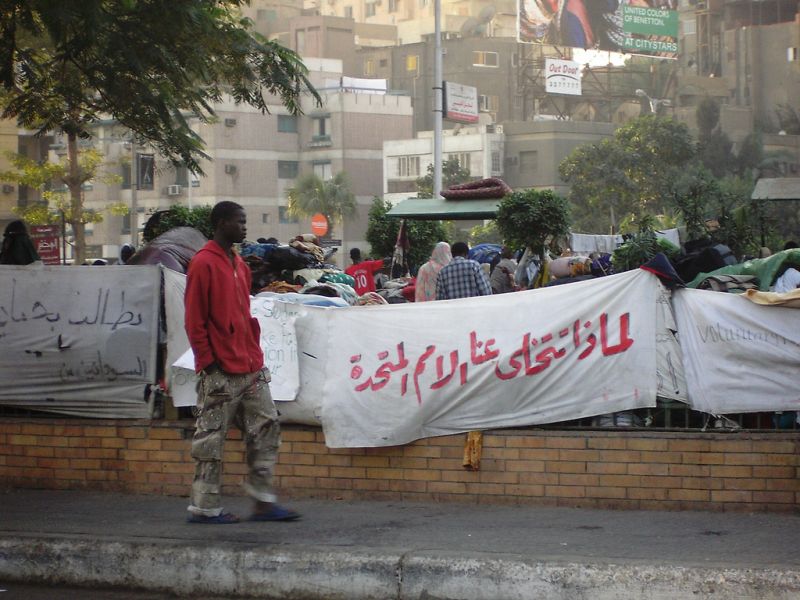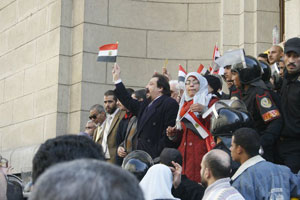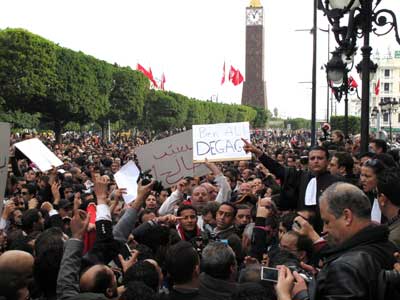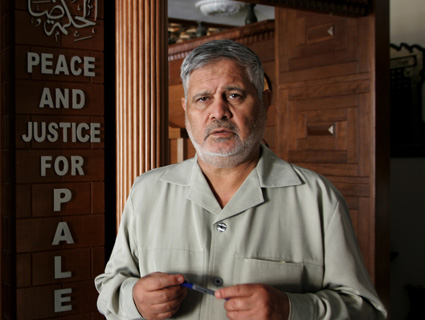
Photo Courtesy of Ahmed Yousef
“The Palestinians believe that most of the Arab regimes are puppets of the United States,” says Ahmed Yousef.
This is why the American-educated deputy foreign minister of Hamas—a terrorist organization in the eyes of United States, Israel, and the European Union—glimpses what could be an opportunity in the wave of pro-democracy demonstrations that have recently swept Tunisia, Egypt, and other Arab nations. With American-backed regimes out of the way, his thinking goes, Democratic governments will take power whose leaders are more sympathetic to the Palestinian cause—and less influenced by Western diplomatic pressure. “If these democratic revolutions bring more Arab patriots to lead the Arab world,” he says, “this will strengthen the Palestinian position.”
Shut out of peace negotiations between Israel and the Palestinian Authority, Hamas has long been viewed as too extreme to bargain with. Yet as these negotiations crumble, Yousef may have the chance to capitalize on the uprisings to bring Hamas back to the table—that is, if the upheaval doesn’t spark a new Palestinian civil war. Yousef hopes the popular revolts in Egypt and Tunisia will inspire long-overdue Palestinian elections, and lead to the formation of a “unity government” that is recognized by the west—and which includes Hamas.
In 2006, Hamas won free and fair Palestinian parliamentary elections, but efforts to form a unity government subsequently collapsed. Hamas then seized control of Gaza amidst a bloody civil war and its political rival, the Western-backed Fatah party, retained control of the West Bank. Gazan civilians have since suffered a devastating blockade by Israel and Egypt, while Fatah has negotiated with Israel on behalf of all the Palestinian people.
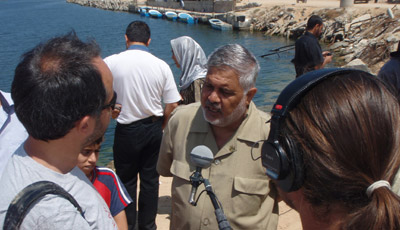 As Yousef slammed Israel’s deadly May 31 flotilla attack, other Hamas officials were raiding the offices of non-profits across Gaza. Photo by Ashley BatesYousef sees the revolt against the autocratic, US-backed regime Egypt as a chance to strengthen his movement’s position, particularly as Egypt’s Muslim Brotherhood, which has ties to Hamas, seems poised to gain political influence. Israeli Prime Minister Benjamin Netanyahu recently referred to the Muslim Brotherhood as a “tremendous threat.” The Obama administration, meanwhile, has said it sees a role for the Brotherhood in a new Egyptian government—so long as the group continues to renounce violence and supports Democratic principles.
As Yousef slammed Israel’s deadly May 31 flotilla attack, other Hamas officials were raiding the offices of non-profits across Gaza. Photo by Ashley BatesYousef sees the revolt against the autocratic, US-backed regime Egypt as a chance to strengthen his movement’s position, particularly as Egypt’s Muslim Brotherhood, which has ties to Hamas, seems poised to gain political influence. Israeli Prime Minister Benjamin Netanyahu recently referred to the Muslim Brotherhood as a “tremendous threat.” The Obama administration, meanwhile, has said it sees a role for the Brotherhood in a new Egyptian government—so long as the group continues to renounce violence and supports Democratic principles.
While Yousef says he appreciates past efforts by the government of President Hosni Mubarak to mediate reconciliation between Hamas and Fatah, he lambasts Egypt and other Arab governments for colluding with western powers. “Most of the people in Egypt support the Palestinians,” he explains. “So if you have a democracy in Egypt, you guarantee that the leaders will stand behind the Palestinians and put pressure on the American administration to be impartial to the conflict.”
In recent days, Palestinians have tried to organize protests in support of Egypt’s anti-government demonstrators, but these attempts have quickly been squelched by Hamas and Fatah. So as much as Yousef may want to see a Democratic revolution come to the Middle East, the government he represents is also threatened by it.
While Yousef decries America’s “pro-Israel” mediation and “subversion” of Palestinian democracy, he looks back fondly on his nearly two decades living and studying in the US. His experience taught him that “America was not this kind of evil that we used to hear about and read about in books.” Over the years, he has contributed to 24 English and Arabic books, many of which plead for East-West dialogue and collaboration. Three of his eight children are American citizens. Occasionally, he uses Google Earth to revisit his former neighborhoods in Los Angeles, Chicago, and suburban Virginia.
Yousef’s background makes him an apt choice to soften Hamas’ image in the Western world. Yousef says he’s “not like those hard-liners who all the time stick to their rhetoric,” and he tries to “use the right language” in representing the Hamas government to Western audiences. A stout, 60-year-old with a warm, affable demeanor, he writes tactfully worded editorials in American, European, and Israeli newspapers. He says that Hamas is a movement of “freedom fighters who all the time are looking to solve the problem peacefully, if that’s possible, and other [ways] if that’s not.””
Yet it’s often hard to square Yousef’s moderate rhetoric with Hamas’ iron-fisted approach to governing and track record of violence. And while he may display the gentler side of a group implicated in numerous suicide bombings and other acts of terror, it’s sometimes unclear whether he’s speaking for anyone but himself; indeed, members of Hamas have accused him of distorting the group’s views.
I first met Yousef this past May in Gaza, at an outdoor, seaside Hamas press conference condemning Israel’s killing of nine Turkish activists on a Gaza-bound flotilla. Surrounded all day by swarms of microphone-wielding foreign journalists, Yousef graciously juggled about 60 interviews in the sweltering sun.
I later learned that, at precisely the same time that Yousef was denouncing these human rights abuses, other Hamas officials were committing their own. Agents from the Hamas government’s Ministry of Interior were seizing laptop computers and interrogating staff members at various non-profits, most of which served Gazan children and university students. Within two days of the flotilla tragedy, six Palestinian charities had been temporarily shut down. (In 2010 alone, Hamas arrested more than 3,000 Fatah supporters and shut down 23 allegedly Fatah-affiliated institutions.)
“I believe we shouldn’t be doing these sorts of things, but it’s like a policy tit for tat,” Yousef told me later, with a deep, sad sigh, explaining that Fatah had done similar things to Hamas-affiliated charities in the West Bank.
Like most Palestinian refugees, Yousef’s childhood was colored by the struggle against Israeli occupation. For the first 18 years of his life, Yousef doesn’t remember ever leaving the one square kilometer of his crowded refugee camp in Rafah, a southern Gaza city that borders Egypt. Two years before he was born, Israeli troops won the 1948 war, and Yousef’s family fled from their home in what is now Israel.
Yousef finally ventured outside his refugee camp to Turkey, the United Arab Emirates, and Egypt, where he earned a bachelor’s degree in mechanical engineering. In the early 1980s, after a traditional arranged marriage with his cousin, Yousef earned a scholarship from Saudi Arabia to study in the United States. “For somebody coming from a refugee camp, going to America and seeing all these advanced technologies and immigrants from all over the world and how they succeed in coexisting and work together—it was an amazing experience for me,” he says. He formed unexpected friendships with liberal American Jews and edited a magazine called Palestine: The Future.
In 1987, Yousef returned to Gaza to take a position as the dean of a new journalism school, but the school shut down during the first intifada, the Palestinian uprising against Israel. He returned to the United States and amassed a plethora of degrees: a master’s in industrial engineering from Colorado State University, a master’s in journalism from the University of Missouri-Columbia, and a PhD in political science from Columbia State University in Louisiana. His dissertation argued that Palestinian journalists suffered more restrictions under Israeli rule than they had under Ottoman rule.
During the late 1990s, Yousef directed a Washington, DC-based think tank called the United Association for Studies and Research and served as editor-in-chief of The Middle East Affairs Journal. He felt “like somebody swimming in honey” as he observed the democratic process unfold on Capitol Hill, and took part in academic conferences and State Department events.
But the feeling wouldn’t last. On September 11, 2001, Yousef and his family watched the horrifying news unfold in their Falls Church, Virginia apartment—about five miles from the Pentagon. That night he kept thinking: “What kind of Muslim would do something like this?” In a 2004 interview with Hezbollah’s Al-Manar television station, he said that he wondered whether 9/11 was a conspiracy orchestrated by Israeli secret service agents who coaxed impressionable Muslims to carry out the attacks. He also published a book, The Zionist Fingerprint on the Post-September 11 World, arguing that “Zionists” are “the driving force behind all these activities to stigmatize Muslims and Arabs with terrorism and radicalism.” Careful to emphasize his friendships with “non-Zionist” Jews, Yousef nonetheless stands by these radical views.
In 2005, Yousef returned to Gaza, where Hamas leader Ismail Haniyeh, who became the prime minister of the Hamas government following the 2006 elections, offered him a position as his senior advisor. Throughout the post-election civil war, Yousef spoke out against violence, and drafted a platform for a unity government. After Hamas seized control of Gaza in June 2007, he conducted behind-the-scenes trips to Europe “to talk to [western leaders] about our vision for a peaceful settlement.” Some analysts have alleged that Yousef overstepped his authority by suggesting that Hamas supported European draft proposals for temporary borders and a five-year cease-fire. Yousef was later demoted from a senior Haniyeh advisor to deputy foreign minister—a move Yousef denies was connected to his European diplomacy.
As for Hamas’ continued support of suicide bombing and rocket attacks against Israeli soldiers and civilians, Yousef says westerners must have a “have a panoramic view,” emphasizing Israel’s disproportionate killing of Palestinian civilians— including Israel’s killing of more than 300 children during its 2008-2009 attack on Gaza. While asserting Hamas’ “right to defend itself” and insisting that exclusively non-violent resistance “doesn’t work” against Israel, he adds, cautiously: “I’m not saying that the blood we’ve seen on both sides is something to be proud of at all.”
Yousef contends that there are “two or three schools of thought” within the Hamas movement, including war-hardened militants who discount his comparatively moderate positions. Taher Nounou, a lower-ranking Hamas government spokesperson, recently charged that Yousef sometimes puts forth his own ideas, which “are not policy.” Yousef laughs off this comment, alluding to inconsistencies between his private views and those he espouses on behalf of Hamas. “You can’t be in the government and speak your mind,” he says.
While Yousef decries the western media’s frequent portrayal of Hamas as thuggish theocrats, he concedes that Hamas isn’t a functioning democracy. He hopes for a Palestinian state modeled after the democratic nation of Turkey, which is currently led by Prime Minister Recep Tayyip Erdogan and his Islamic party. Yousef says, “If anybody tries to understand Hamas, they should look to us as Erdogan, not Taliban.”
These days, following Al-Jazeera’s release of documents detailing the Fatah government’s sensitive concessions to Israel in peace negotiations over the past decade, Yousef is concerned about the possibility of violent internal Palestinian conflict. Over the weekend, Palestinians launched rival Egypt-inspired Facebook campaigns—one calling for uprisings against the Fatah government of the West Bank and another calling for uprisings against the Hamas government of Gaza. “Politically, we are in a dire situation now—a lot of accusations, lies, and cursing,” Yousef says.
On the other hand, Yousef also sees the transformative energy created by the pro-democracy uprisings in Egypt and Tunisia as a chance to promote Palestinian democracy. “The Palestinian tragedy is that we are now two governments for a people without a state,” he says. “The only salvation is to hold an election.”
